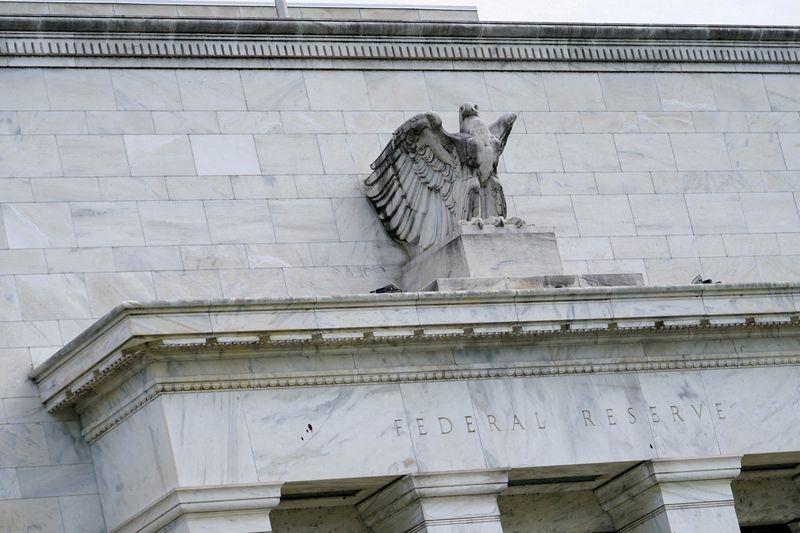LONDON (Reuters) -Don't go anywhere: an event-packed week is coming up with central banks from the United States to Brazil and from Europe to Japan meeting.
The Federal Reserve should deliver its first interest rate cut in four years, Brazil could hike for the first time since 2022 and Japan will be mindful of volatile markets as it mulls when to lift rates again.
But it is not all about central banks, with UniCredit's move on Commerzbank (ETR:CBKG) reviving M&A talk among European banks.
Here's your week ahead primer in world markets from Lewis Krauskopf in New York, Rae Wee in Singapore, Marcela Ayres in Brasilia, and Naomi Rovnick, Karin Strohecker, and Tommy Wilkes in London.
1/ TIME AT LAST
The Fed is tipped to conclude a two-day meeting on Wednesday with its first rate cut of this cycle. The key question now is how much and how fast easing comes.
A quarter point hike is fully priced, while markets now price in a roughly 60% chance of a bigger, half-point move.
Latest data showed consumer prices rose slightly in August, but core inflation was a bit stickier.
Fed Chair Jerome Powell's news conference will be scrutinised for hints of the potential pace of rate cuts. August employment data was weaker-than-expected for a second straight month, raising some concern the Fed may be too late with easing.
Traders still price over 100 bps of Fed cuts by year-end, creating a potential disconnect between markets and the Fed's dot-plot projections.
2/ UP, NOT DOWN
Also on Wednesday, Brazil's central bank is expected to diverge from the Fed by kicking off a tightening cycle given above-target inflation at 4.25% and stronger-than-expected growth in Latin America's largest economy.
Since keeping rates at 10.50% in July, the bank has hinted it could raise borrowing costs to meet its 3% inflation target. The hawkish stance, reinforced by incoming governor Gabriel Galipolo, has fuelled bets on a forthcoming 25 bps hike that could bolster the real..
But Brazil is an outlier among emerging economies.
In South Africa, where inflation is nearing its target, policymakers are expected to trim rates for the first time in four years on Thursday. Turkey is expected to hold rates at 50% the same day, but potentially cut in November.
Indonesia's central bank, meeting on Wednesday, has flagged a possible fourth-quarter rate cut.
3/ ANOTHER ODD ONE OUT The only way for Japanese rates is up. At least, that is what Bank of Japan policymakers suggest, though doing so this month would come as a huge surprise. The BOJ is not expected to change rates at its policy meeting, which ends on Friday, with focus on the tightening path ahead following two hikes already this year. Going against the tide of global easing, BOJ policymakers have expressed their resolve to raise rates further, so long as markets behave and economic conditions remain favourable. That has helped the yen, which is up more than 10% from July's 38-year low, though investors remain nervous about any further unwinding of yen-funded carry trades that could spark renewed volatility.
4/ UNPREDICTABLE
The Bank of England and Norges Bank are expected to keep rates unchanged when they meet on Thursday. The BoE is tipped to ease twice more by year-end and Norway could start easing by then.
It is hard for anyone, including possibly the world's top central bankers themselves, to have much confidence in such forecasts. Any surprises from the Fed could potentially upend the global monetary policy outlook.
An unexpectedly dovish Fed could weaken the dollar, alter inflation projections for nations, such as Britain that import dollar-priced commodities and prompt Norges Bank to support the oil-linked crown.
Fed commentary that casts doubt over steady easing from here could boost the dollar and tighten financial conditions worldwide.
Investors rely on market forecasts for central bank policy. It might be best to ignore them for now.
5/ IT'S BACK, OR IS IT?
UniCredit's swoop on Commerzbank has sparked speculation that long-awaited European banking M&A is back.
The Italian bank unveiled a 9% stake in the German lender - half of it bought directly from the German state. UniCredit CEO Andrea Orcel is keen to buy more or even take Commerzbank over should it want a tie-up.

Investors are now watching whether Orcel can overcome the many hurdles that have stymied previous deals among European banks, including political opposition, and if more banks begin angling for other deals.
Possibilities are numerous. In the meantime, investors are buying banking shares. Commerzbank shares rallied nearly 20% in two days, the European bank index gained almost 2%.
(Graphics by Prinz Magtulis, Kripa Jayaram, Sumanta Sen, Pasit Kongkunakornkul and Vineet Sachdev; Compiled by Dhara Ranasinghe; Editing by Tomasz Janowski and Kevin Liffey)